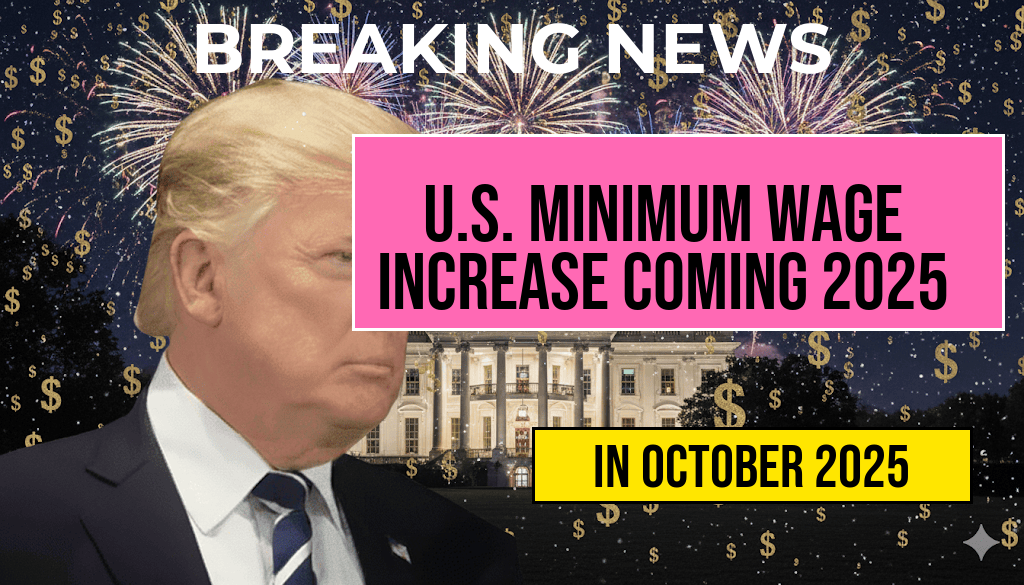The U.S. is set to see a significant increase in the federal minimum wage in 2025, as announced by the U.S. Department of Labor. Effective October 4, 2025, the minimum hourly pay rate will rise to $15.00, marking a notable shift in wage policy aimed at addressing inflation and improving living standards for low-income workers. This increase is part of a broader effort by the Biden administration to enhance economic security for American families. Advocates argue that a higher minimum wage will not only benefit workers but also stimulate consumer spending, while critics raise concerns about potential impacts on small businesses. As the nation prepares for this change, it is essential to explore the implications of the new wage structure and what it means for workers, employers, and the economy as a whole.
Details of the Minimum Wage Increase
The planned increase to $15.00 per hour will apply to all sectors of the economy, including retail, hospitality, and service industries. The adjustment reflects the government’s commitment to creating a living wage that aligns with the rising cost of living in many parts of the country. Over the last decade, the federal minimum wage has remained stagnant at $7.25, prompting calls for reform from various advocacy groups.
Key Dates and Pay Rates
| Date | New Minimum Wage Rate |
|---|---|
| October 4, 2025 | $15.00/hour |
Implications for Workers and Employers
The increase in the minimum wage is expected to have various effects on the workforce and businesses. For workers, a higher wage means increased purchasing power, which can lead to improved quality of life. Many low-wage workers have struggled to meet basic needs, and this adjustment is anticipated to alleviate some financial pressures.
- Increased Income: Workers earning minimum wage will see their income rise, which is expected to reduce poverty levels.
- Potential Job Creation: The increase may lead to higher spending, stimulating job growth in consumer-driven sectors.
- Challenges for Small Businesses: Small businesses may face increased labor costs, which could affect their operations and profitability.
Reactions from Various Stakeholders
Responses to the planned wage increase have been mixed. Labor unions and worker advocacy groups applaud the decision, arguing that it is a step towards economic justice. According to the Forbes, many advocates believe that the increase will help lift millions out of poverty.
Conversely, some business owners express concerns about the timing and impact of the wage hike. They argue that increased labor costs could lead to higher prices for consumers or even layoffs. A study published by the Wikipedia outlines various economic theories surrounding minimum wage increases, highlighting the ongoing debate over their effects on employment levels.
Looking Ahead
The implementation of the new minimum wage will be closely monitored, with economists and policymakers assessing its impact on employment rates, business operations, and overall economic health. As the date approaches, discussions surrounding wage policies are expected to intensify, with various stakeholders advocating for their positions.
In the meantime, workers and employers alike are urged to prepare for the upcoming changes. While the increase is a positive development for many, it is essential to consider the broader economic landscape and the potential challenges that may arise as a result of this significant policy shift.
Frequently Asked Questions
What is the new minimum wage rate set to take effect in 2025?
The new minimum wage rate will be increased to $15 per hour, effective October 4, 2025.
Why is the minimum wage being increased?
The increase aims to address the rising cost of living and ensure that workers receive fair compensation for their labor.
Who will be affected by the minimum wage increase?
The increase will affect all employees covered under federal law, including part-time and full-time workers across various industries.
Are there any exceptions to the new minimum wage rate?
Yes, certain employees such as tipped workers and those in specific industries may have different minimum wage requirements based on state laws.
How will the minimum wage increase impact businesses?
Businesses may experience increased labor costs, but they may also benefit from a more motivated workforce and potentially higher consumer spending by employees.

Leave a Reply